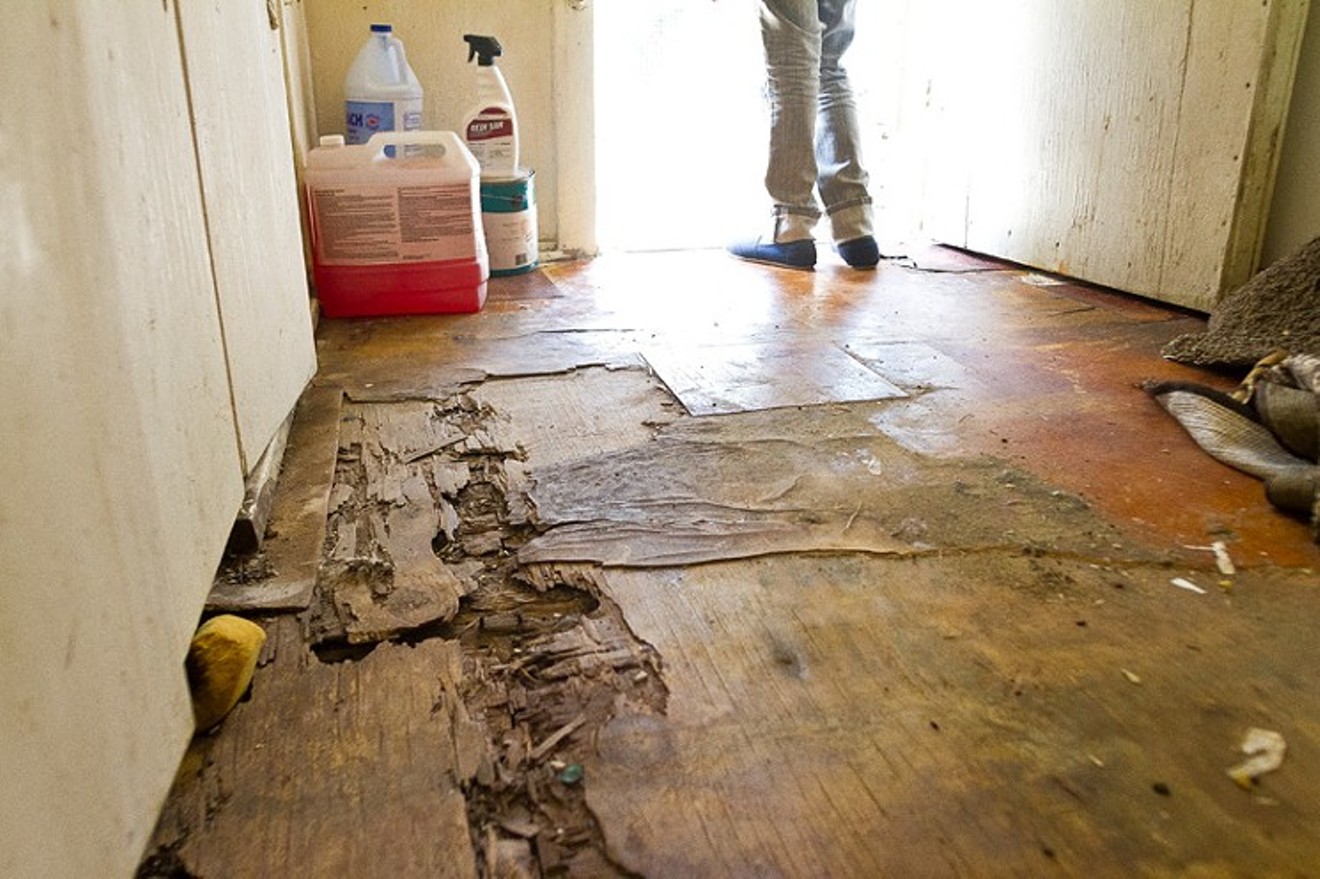My own feelings notwithstanding, it’s immensely significant that the seasoned, accomplished reporters and producers who put this piece together chose Khraish as a national focal point. It was a shrewd call.
Khraish, who owns hundreds of houses in West Dallas at the center of an eviction crisis, is either a predator feeding on the poor or a counterintuitive hero putting rooftops over the heads of impoverished families betrayed by an incestuous union of liberalism, capitalism and government.
Maybe first I should do the disclaimers. What I do here is part reporting, part opinion, and on the opinion side, I have leaned strongly toward Khraish, against the people who call him a predator.
This is what struck me about the Frontline piece as an exercise in journalism, the craft I have worked at all my life. I thought the piece was a perfect illustration of what I have come to believe about my vocation. It’s not right, and it’s not wrong to say we journalists have a liberal bent. Mostly what we are is shallow.
If you go in with a kind of soft-focused set of precepts in the back of your mind, if you work some place where stories that are too counterintuitive make the bosses all antsy, and if you don’t have much time to work on it anyway, then you’re going to come down somewhere in the Garden of Easy, where poor people are Adam and Eve and the people who sell or rent to them are snakes. Always. More or less.
That’s where this Frontline piece winds up, more or less. The journalists spend a lot of time talking to Khraish and give him ample opportunity to sell his side of the story. He believes the West Dallas eviction crisis of the last year has been driven by a wildfire of gentrification in West Dallas aided and abetted under the table by a regime at City Hall that wants to cleanse whole neighborhoods to clear the ground for high-end apartment developers.
The Frontline piece gives Khraish some partial corroboration from a quarter I found surprising: Veteran Dallas desegregation activist and affordable housing lawyer Mike Daniel didn’t say anything good about Khraish as a person, but he agreed with Khraish’s basic premise. Daniel didn't buy the claim of Dallas Mayor Mike Rawlings to have been stunned when he learned that poor families in West Dallas were being threatened with eviction.

Gentrification and tougher building codes in West Dallas are the same demons that pushed immigrant garment workers out of New York's Lower East Side in the early 20th century.
Mark Graham
Frontline: “You're saying the city looks at this and is secretly happy.”
Daniel: “Yeah. In fact, the landlord paid the money; the city didn't have to spend the money. I mean, it's the solution.”
A couple of things in the Frontline piece really grated on me, however. For one, it allowed a city lawyer to lie through her teeth about how the whole crisis got started.
Assistant City Attorney Melissa Miles said, “I don't have a ton of sympathy for someone who got away with something, to their benefit, to the detriment of other people who weren't in a good negotiating position.
“I don't have a lot of sympathy for those folks who say, 'But I've gotten away with it all this time. Why are you changing the rules on me now?' To that, I would say we haven't changed any rules.”
That’s wildly and emphatically a lie. The eviction crisis came about because the Dallas City Council changed the rules and changed the law last year, imposing tougher standards that would have forced Khraish to invest millions of dollars in his houses or face fines that theoretically could have reached a million dollars a day.
That’s wildly and emphatically a lie. The eviction crisis came about because the Dallas City Council changed the rules and changed the law last year.
tweet this
The council never looked at whether the new building standards could be achieved within existing rent structures. The council made its decision without even considering, without even thinking about what effects it might have on tenants. And the same City Council in the same time period voted down a measure to increase the supply of government-subsidized affordable housing in the city.
The City Council and the city attorney’s office (under a prior regime) thought they had landlords like Khraish over a barrel: Do what we tell you or die, fool! But Khraish’s attorney, John Carney, outsmarted them.
Carney found a provision in state law allowing a landlord to escape draconian fines by simply evicting his tenants and then spending the next six months either getting the property up to the new code or bulldozing it and removing it permanently from the rental market. In an atmosphere of rapidly rising land values and redevelopment opportunities, Khraish decided on the 'dozer.
When Khraish’s decision to evict went public, city lawyers like Miles were outraged, but only because they were stupid. They hadn’t known ahead of time that Texas law would offer Khraish an out.
But think about it. It’s America. How often can a City Council just take a baseball bat to some property owner and say, “Ha ha, we got you; give us your land or your money,” without there being some form of recourse? The council could have looked it up. This isn’t Russia. Not supposed to be.
Frontline spends a good deal of time showing viewers scenes of decay and filth inside the home of former Khraish tenant Pearlie Mae Brown, a woman I have written about multiple times. What Frontline doesn’t get to, I assume because it didn’t have time, is that Miles is the reason Brown’s house didn’t get repaired for a long time.
The city gave Catholic Charities a grant of $300,000, of which Catholic Charities was allowed to skim $30,000 for “administration,” to be spent fixing houses like Brown’s. But that process was stymied for months when Miles told a judge she didn’t want any money spent fixing anything that might help Khraish.
Khraish, as you may know, eventually agreed to sell more than a hundred houses to the tenants, financing the sales himself. Frontline looked at those mortgage notes and said this: “Deals like this have many names and different structures. They’re sometimes called seller-financed home sales, contract for sale, deed for sale, land contract, rent to own. What they are not is a federally backed mortgage, which provides legal protections for the buyer.”
Sure, but none of that is true, exactly. The Khraish sales are not land contract sales or rent-to-own sales or any of those. His sales are formal deed-of-trust sales. These are not just different names for the same thing, as Frontline suggests. These are different names for quite different things.
The Frontline piece broad-brushes the “federally backed mortgage” (which could mean any number of things) as providing “legal protections for the buyer.” Maybe, sorta, not really. A federally sanctioned mortgage is the same as any other mortgage: If you don’t pay, you lose the house.
Fannie Mae mortgages give homeowners a chance to “short-sell” houses — sell them for less than they owe without being foreclosed — but they still lose the houses, they still owe what they still owe, and they can’t get another Fannie Mae mortgage for three years.
None of Khraish’s very poor tenants could ever have hoped to qualify for a federally backed mortgage.
tweet this
Then there is this: None of Khraish’s very poor tenants could ever have hoped to qualify for a federally backed mortgage. None of them, he has told me, could have qualified for any kind of mortgage except the one he gave them. So, yes, he gets to set the rules.
The Frontline piece touches — barely — on what feels like an answer to all of this. A reporter interviews David Favalaro, head curator of the Tenement Museum in New York. Favalaro names a familiar demon as the force that pushed poor renters out of tenements on the Lower East Side of Manhattan in the early 20th century: building codes and gentrification. He says, “The only counterweight to that is government.”
The bottom line in the "shmatta" district in New York and the bottom line in West Dallas are the same: Landlords are not charities. The ones who rent to the poor must and will operate for the profit they can make within the ceiling imposed by what poor people can afford to pay. Add a corner, and they will cut a corner. If they can’t cut a corner, they will get out of the landlord business.
The counterweight, as the tenement museum curator said, is government. If somebody at Dallas City Hall — or somebody reading this article — is truly moved by the plight of poor tenants and wants to do something about it, then the obvious mechanisms are politics, public policy and government. If we want poor people to live in better housing than what they can afford on the private market, then we must pay for the improvements. We can’t force private persons do it for us at their own expense at the point of a gun because, again, this is not Russia. Yet.
I still say the bottom line in West Dallas is that Khraish Khraish is the only guy keeping poor families indoors. I know that just because I like what he’s doing, PBS Frontline doesn’t have to agree. I just wish PBS Frontline had been a little bolder in taking on some stereotypes. But, you know: “SLUMLORD EMERGES AS GOOD GUY.” Where are you ever going to see that headline? Besides here, I mean.













